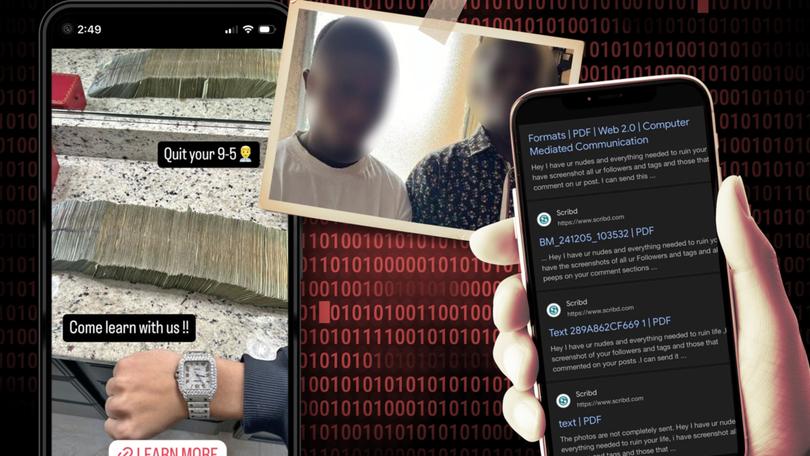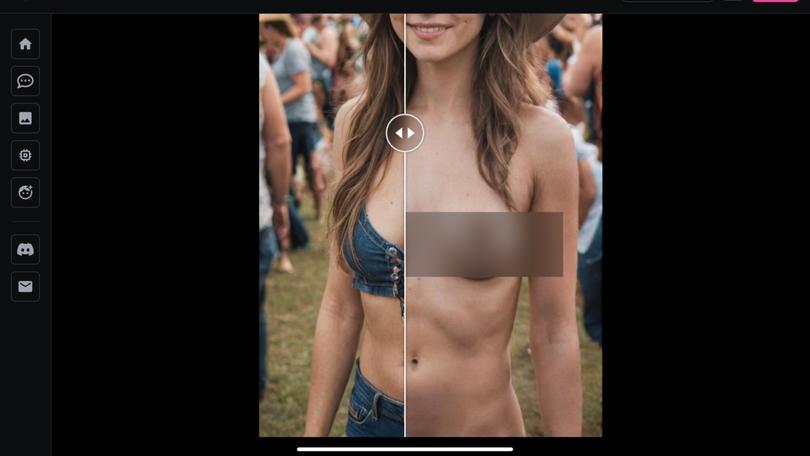Yahoo Boys: Nigerian scam schools teaching recruits to target Aussie teens with rip-offs and lethal sextortion
The expose on the scam schools comes as Nigeria gets set to prosecute two men whose sextortion scheme resulted in the death of a NSW teenager.

Infamous cybercriminals known as the Yahoo Boys are now running “scam schools” teaching recruits how to cash in on everything from financial scams to sextortion using deepfake nude and porn photos.
Social media platforms TikTok, Scribd, Telegram and Facebook are being used to advertise master classes, according to intelligence experts, while kingpins are setting up physical training rooms in Nigerian cities aiming to target wealthy westerners like Australians.
The revelations come despite a massive crackdown by authorities in Nigeria on internet criminals and the first ever in-country prosecution of two men for a sextortion fraud which led to the suicide of a young man from NSW.
Sign up to The Nightly's newsletters.
Get the first look at the digital newspaper, curated daily stories and breaking headlines delivered to your inbox.
By continuing you agree to our Terms and Privacy Policy.The prosecution of the men was due to the work of NSW and Federal Police liaising with Nigerian police. The trial is due to commence in the next few weeks.
The scam schools - also known as Hustle Kingdoms or academies - are enticing recruits to join their networks with blatant social media posts promising a lifestyle of cash, expensive cars, and high-end watches, according to cybercrime experts.
Last month Nigerian anti-corruption officers busted a dedicated scam school in Benin City, the capital of Edo State, arresting 25 suspects and seizing six exotic cars, laptops and phones.
A statement from the Economic and Financial Crimes Commission(EFCC) said “The suspects’ arrest at their hideout was triggered by credible intelligence that indicated the apartment was being used as a yahoo academy or training school for internet-related fraud and other fraudulent activities.”
Paul Raffile, an Intelligence Analyst with Network Contagion Research Institute (NCRI) said there has been a surge in sextortion scams in the past few years in Australia, the US and Canada.
In Australia complaints about sextortion in all forms have jumped from 432 reports in 2018/19, to 6,187 reports in 2022/23, a 1,332 per cent increase according to the eSafety Commission. The extent of the problem is mirrored in social network forum Reddit’s sub-topic, r/sextortion, which was established in 2020 to help victims. It now has 33,000 subscribers as of February 2025 and, according to NCRI, had more than a million views in one month.
Research by the US-based NCRI shows the boom in blackmails can be linked to the uptick in the scam schools’ distribution of instructional scripts and videos. Recruits are skilled up in cold-call messages, writing blackmail scripts, and using apps for voice changing and real-time face swapping videos.
The recruitment posts which take just seconds to find on social platforms include teasers like “Quit your 9-5. Come learn with us” together with photos of wads of US dollars and what looks like a diamond encrusted watch.
Mr Raffile said experienced blackmailers continue to be able to post on platforms despite his warnings to the administrators.

“Numerous sextortion scripts and handbooks still exist on TikTok a year later,” Mr Raffile said.
“Some platforms have done a better job than others at taking down this criminal material.
“Criminals are still organising and promoting this scam, recruiting lower-level scammers from their social media following.”
Meta is yet to respond to requests for comment but a spokesman for TikTok said Attempts to defraud or scam members of the community are prohibited as they violate our strict community guidelines.
“Over 98 per cent of videos in Australia removed for violating our Frauds and Scams Policy are taken down proactively before anyone has reported them. As always, if someone sees a video or account they believe violates our community guidelines, they can report it in app,” he said.
The Yahoo Boys, whose moniker goes back to their email addresses used in early Nigerian email scams, have been described as a “major threat actor” and are involved in the latest sextortion twist using deepfake nudes.
Criminals only need online pictures of a victim and a widely available clothing removal app to create the deepfake photos.
Mr Raffile said the AI clothing removal apps are absolutely a growing risk.
“We are already seeing incidence of teens being targeted in sextortion schemes with artificially generated nude photos of themselves. They are being asked to pay money in order to prevent distribution of these embarrassing photos,” he said.

“These technologies should not be available in the online-stores because they violate the terms of service and there are minimal safeguards to prevent abuse of these systems by criminals who seek to target minors.”
Australia’s eSafety Commissioner Julie Inman Grant said they were “aware that AI driven nudity apps are already being used to create ‘deepfake porn’ or image-based abuse material which can be used to carry out sexual extortion.”
She warned warned young men aged from 18 to 24 are most at risk.
“Organised criminals are often early adopters of advanced technology and we’ve already seen the use of face-swapping technologies in video calls and recent sexually explicit audio and video deepfakes being manipulated to blackmail Australians for substantial sums of money,” she said.
Ms Inman Grant said tough new laws introduced last year carry serious penalties for anyone sharing sexually explicit material online without consent and it includes deepfakes.
Mr Raffile said Australia’s decision to raise the minimum age to 16 for social could help protect younger teens from scams, but further steps must be taken to make social media platforms safer.
